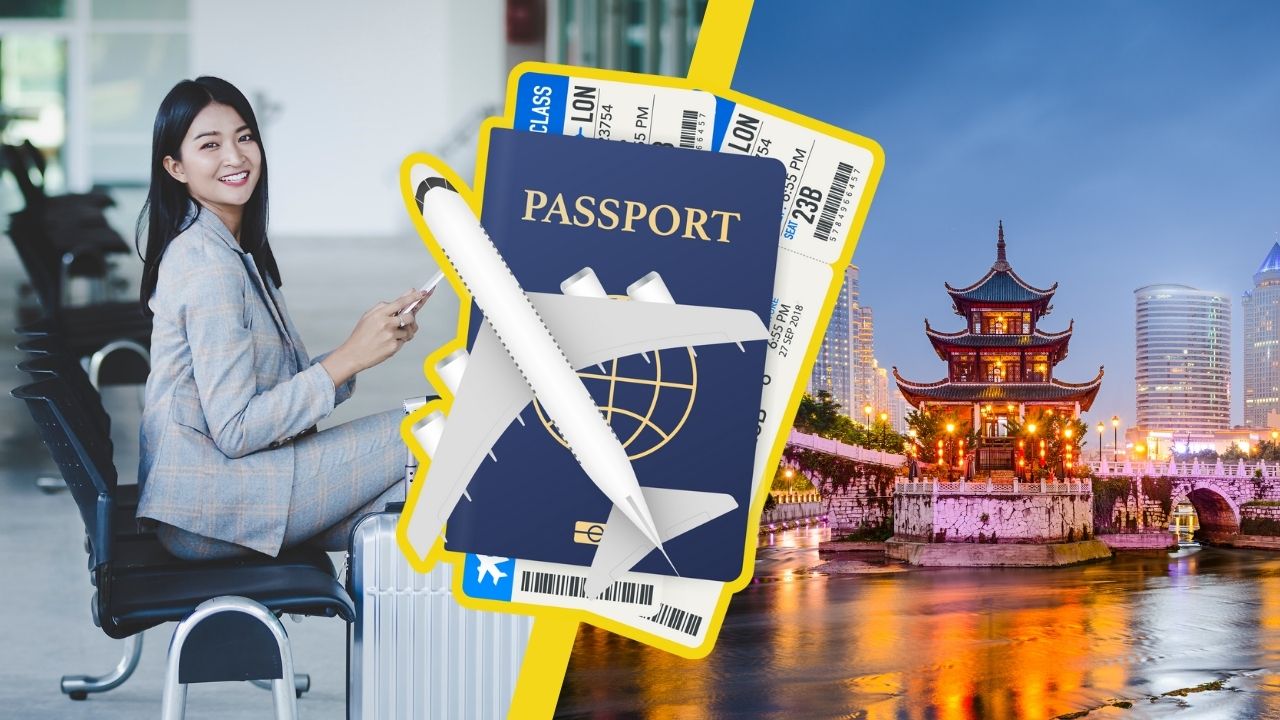How to Get a VISA in China - A Guide for Employers
07 Feb, 202511:33Many businesses are expanding their search for international talent to help strengthen their...

Many businesses are expanding their search for international talent to help strengthen their workforce. As one of the world’s largest and most dominant economies, China has become a top destination for global companies and foreign professionals. Chinese businesses often look overseas to find skilled specialists who can fill gaps in the domestic labour market, bringing fresh perspectives, unique expertise, and valuable international experience.
China has been making significant efforts to attract foreign expat workers in recent years. The number of expatriates working in the country continues to grow, especially in finance, technology, and education sectors. The Chinese government has implemented a series of policies over the last decade to draw educated and skilled talent worldwide. These efforts have yielded positive results, with increasing numbers of Chinese professionals returning from overseas and attracting more foreign workers to the country. The National Bureau of Statistics of China reported that the estimated total of rural migrant workers in 2022 reached 295.62 million, a 1.1% increase from 2021. The latest figure for 2024 now estimates approximately 299.7 million. These workers comprise more than one-third of the country’s working population, proving that China’s reforms have made it easier for foreign companies and workers to enter the Chinese market. The ‘Green Card’ system has also been another tactic to attract expatriates, simplifying residency options for highly skilled talent. These measures are part of China’s global development strategy to improve innovation and sustain economic growth.
For expatriates, China offers much more than just career opportunities – it provides the chance to experience a vibrant and one-of-a-kind culture. Cities such as Shanghai and Beijing offer an exciting blend of modern living, advanced infrastructure, and a rich cultural landscape. From high-rise skylines to diverse cuisines, foreign workers in China can enjoy a rewarding and unique lifestyle.
However, companies hiring foreign talent must be able to navigate China’s visa process. With strict regulations and specific requirements, getting a work visa can be complicated, so employers and job seekers must fully understand what’s involved. In this blog, we’ll walk you through the key steps for obtaining a Chinese work visa, also known as the Z-visa. We’ll outline the eligibility criteria and application process to ensure businesses can easily and compliantly recruit in China.
Please note that Hong Kong and Macao have different visa requirements.

What is the Z-Visa?
To hire foreign workers in China, employers must facilitate the process of obtaining a Z-visa, the only legal option for long-term employment in the country. Before foreign employees can apply for a Z-visa, they need to have secured a job offer from a Chinese employer legally authorised to hire foreign nationals.
The Z-Visa is designed for professionals in various industries, including engineering, technology, finance, education, and healthcare. It’s issued based on a job offer and allows the visa holder to work legally within the country for the duration of their employment contract. Upon arrival in China, the Z-visa must be converted to a Residence Permit, as it’s only valid for 30 days upon arrival in China. The residence permit allows the visa holder to live in China for an extended period and may allow them to bring immediate family members under certain conditions.
For companies that aren’t offering long-term employment contracts, China also offers alternative visa options:
- R-Visa: for high-level talents and specialists
- F-Visa: for short-term exchanges, visits, or internships
- M-Visa: for commercial and trade activities
Categories of China’s Work Visa
China’s work visa system is categorised into three primary types, determined by the applicant’s qualifications, experience, and the nature of the job they’re being hired for. This system operates within a points-based framework, which the Chinese government uses to assess the contribution and potential of foreign professionals. The categories are:
Category A (High-Level Talent)
- Designed for top-tier professionals such as industry experts, senior executives, scientists, or individuals recognised for outstanding achievements in their field.
- Applicants enjoy preferential treatment during the visa application process, often bypassing some regulatory hurdles that apply to other categories.
- This category also includes those who score over 85 points on China’s point-based evaluation system.
Category B (Skilled Professionals)
- Includes expatriates with considerable work experience and a specific skill set that’s in demand in China.
- Typically applies to those with a bachelor’s degree or higher and at least two years of professional experience.
- These professionals are valuable but not deemed ‘high-level’ experts under the Chinese classification system.
- Candidates in this category must score between 60 and 85 points.
Category C (Seasonal Workers and Other Foreign Hires)
- Applies to lower-level workers, including those who take up temporary (less than 90 days), seasonal, or internship roles.
- Generally face more limitations regarding visa duration and may require additional governmental approval to remain in the country long-term.
- They typically score below 60 points.
Point-Based Qualification System
As outlined above, the Chinese government uses a point-based system to classify foreign professionals into A, B, or C categories. This system evaluates individuals by assigning points based on several factors, including:
- Educational background: higher education degrees (such as PhDs or masters) earn more points.
- Work experience: extensive work experience, particularly in specialised fields, adds points.
- Age: candidates between 18 and 60 score higher, with those in their 30s to 40s being most favoured.
- Salary level: applicants with a salary six times higher than the average local salary are awarded extra points.
- Language skills: proficiency in Mandarin can boost the score.
- Location of employment: working in China’s less developed regions may earn additional points.

Eligibility Requirements for a China Work Visa
To apply for a Z-visa, the candidate must meet several qualifications, and the employer must also satisfy certain conditions to sponsor foreign employees. These guidelines are in place to ensure the quality of the international workforce while safeguarding the interests of both employers and workers. The requirements are as follows:
- The applicant must be at least 18 years old
- Have a valid passport with at least 6 months validity remaining and 2 blank pages for visa stamping
- Possess relevant skills and work experience for the position
- Have no criminal record. To obtain this document:
- The prospective employee must apply for a criminal background check from the relevant authorities in their home country.
- Have the document notarised by a public notary or solicitor.
- Get the document authenticated or apostilled by their country's designated authority.
It's important to note that if an applicant has lived in multiple cities in China, they may need to apply for several Police Clearance Certificates, one for each city of residence.
- Be in good health and free from contagious diseases
- Have a job offer from a registered employer in China
- Hold a bachelor’s degree or higher (some exceptions apply for highly skilled workers). The degree doesn't necessarily need to be specific to the job role but must be authenticated and notarised.
For more details on the requirements, follow this link to the Chinese Visa Application Service Center.
Application Process and Where to Apply
1. Employer’s Role
Employers must ensure their company is legally registered and has no history of serious violations or breaches of trust. To hire a foreign worker, the employer must apply for a ‘Notification Letter of Foreigner’s Work Permit,’ issued by the PRC Ministry of Human Resources and Social Security. To receive the letter, the employer must submit the relevant documents to the local labour bureau, including the job contract, company registration details, and a description of the position.
In recent years, the Chinese government has streamlined the work permit application process for foreign employees. The State Administration of Foreign Experts Affairs (SAFEA) now oversees all procedures, including Z and R visa categories. This online system allows for electronic document submission, cutting the required paperwork by nearly half and making the process much more efficient.
2. Employee’s Responsibilities
Once the work permit notification has been issued, the employee can apply for the Z-visa at the nearest Chinese consulate or embassy in their home country. Individuals between 14 and 70 must complete two steps for all Chinese visas: submit an online visa application and visit a designated China visa application center in person. Required documents include but not limited to:
- Valid passport
- Recent passport-sized photos in white background (48mm x 33mm)
- Completed visa application form online
- Notification letter of foreigner’s work permit
- Residence proof in the application country
3. Entry and Conversion to Residence Permit
After receiving the Z-visa, the employee can enter China. Upon arrival, the employee is required to register their residence with the local Public Security Bureau (PSB) within 24 hours. If they're staying in a hotel at first, the hotel management will typically handle this registration automatically. However, they must notify the local authorities of their new address when they move into permanent housing.
Within 30 days of arrival, the employee must apply for a residence permit, effectively converting their Z-visa into a long-term visa. This permit allows them to live and work legally in China for the duration of their employment contract. To ensure timely processing, the employee should visit the local PSB at least one week before their Z-visa expires. During this process, the employer must verify the employee’s job status.

Partner with a Leading EOR Company
As a leading global workforce solutions provider, NES Fircroft offers comprehensive guidance and support for companies looking to hire international talent in China. With local offices in Shanghai, Shenzhen, and Qingdao, we work closely with clients to deliver tailored recruitment solutions in China that ensure compliance and a seamless transition for both your company and employees. Our Employer of Record Services covers all aspects of your global recruitment – we handle employment requirements, payroll, and tax and ensure you remain compliant with immigration labour law.
Interested? Contact us today to learn how we can help you bring the best international talent to China.









